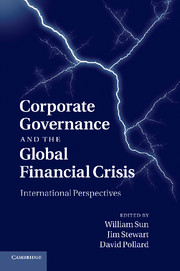Book contents
- Frontmatter
- Contents
- Figures
- Tables
- Contributors
- Acknowledgements
- 1 Introduction: rethinking corporate governance – lessons from the global financial crisis
- Part I The failure of the market approach to corporate governance
- Part II Ownership, internal control and risk management: the roles of institutional shareholders and boards
- 7 A review of corporate governance in UK banks and other financial industry entities: the role of institutional shareholders
- 8 Ownership structure and shareholder engagement: reflections on the role of institutional shareholders in the financial crisis
- 9 Board challenges 2009
- 10 Do independent boards effectively monitor management? Evidence from Japan during the financial crisis
- 11 Risk management in corporate law and corporate governance
- Part III Post-crisis corporate governance: the search for new directions
- Index
- References
10 - Do independent boards effectively monitor management? Evidence from Japan during the financial crisis
Published online by Cambridge University Press: 05 August 2011
- Frontmatter
- Contents
- Figures
- Tables
- Contributors
- Acknowledgements
- 1 Introduction: rethinking corporate governance – lessons from the global financial crisis
- Part I The failure of the market approach to corporate governance
- Part II Ownership, internal control and risk management: the roles of institutional shareholders and boards
- 7 A review of corporate governance in UK banks and other financial industry entities: the role of institutional shareholders
- 8 Ownership structure and shareholder engagement: reflections on the role of institutional shareholders in the financial crisis
- 9 Board challenges 2009
- 10 Do independent boards effectively monitor management? Evidence from Japan during the financial crisis
- 11 Risk management in corporate law and corporate governance
- Part III Post-crisis corporate governance: the search for new directions
- Index
- References
Summary
The financial crisis that originated in the collapse of the US subprime loan market had a serious impact on the global economy; various companies in all industries experienced serious performance declines. For example, Toyota Motor Corp., a Japanese representative automobile manufacturer, fell into a negative operating income situation for the accounting year ended March 2009, reporting red ink for the first time since the end of World War II. Such serious performance decline engenders severe conflicts among corporate stakeholders.
This chapter investigates whether outside directors effectively monitor management in the interest of shareholders. Specifically, the chapter examines the relationship between board independence, management turnover and dividend policy in Japan during the financial crisis. Corporate board structures recently have received much research attention. This increased attention is largely attributable to the Sarbanes-Oxley Act (SOX), which mandates that the audit committees of listed companies comprise a majority of independent members.
- Type
- Chapter
- Information
- Corporate Governance and the Global Financial CrisisInternational Perspectives, pp. 188 - 214Publisher: Cambridge University PressPrint publication year: 2011
References
- 3
- Cited by



